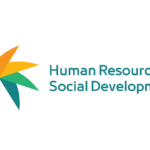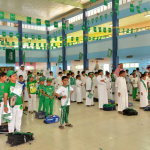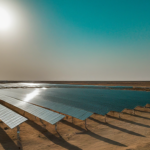
“While eastern Iraq will be home to the highest temperatures on Wednesday, with widespread measurements of 49 C (120 F) and above expected, readings above 38 C (100 F) will be common across Syria, Jordan, Saudi Arabia, Oman and parts of Iran.”

“ACWA owns directly or in part a total stable of plants producing nearly 6 million cubic meters per day of water desalination capacity and over 34 GW of power generation capacity. Fifteen percent of its energy production is through renewable energy projects, either solar or wind. The hydrogen plant in Neom would make ACWA one of the lead producers of green hydrogen and ammonia worldwide and one of the most important firms in Saudi Arabia, second only to Saudi Aramco.”
-Jean-François Seznec and Samer Mosis writing for the Atlantic Council analyze the recently signed joint venture agreement between Air Products of the United States, Neom and ACWA Power to build the largest green hydrogen and green ammonia plant in the world. [Atlantic Council]

“According to the Saudi Arabia General Authority for Statistics, women’s labor force participation rates increased from 19% in 2016 to 26% by the fourth quarter of 2019. Their employment also rose by around 9% during that period.”
-Dr. Carole Chartouni and Ekaterina Pankratova writing for World Bank Blog examine the impact of Covid-19 on Saudi employment patterns and offer recommendations on how to maintain positive developments in female employment. [World Bank]

“Hajj this year is for the heroes who saved the country and saved our people, they deserve it … I personally would have loved to go but there are priorities.”
-Nour al Ghamdi, a Saudi citizen interviewed by Reuters, who expressed sadness but understanding at the reduced size of the Hajj this year. According to Reuters, those chosen will receive supplies including special ihram garments, toiletries, and a prayer rug in a suitcase from the Saudi haj ministry, as well as pre-arranged meals. They will be required to maintain social distancing. [Reuters]

“Nose art must be ‘distinctive, symbolic, gender-neutral, intended to enhance unit pride, designed in good taste.'”
-Jamie Hunter writing for The Drive reports on the nose art on U.S. Air Force F-15 Eagles stationed at Prince Sultan Air Base, Saudi Arabia, as part of the 44th Fighter Squadron, the “Vampires”. Hunter discusses past ‘nose art’ policy and the 44th Squadron’s maintainers “bold and remarkably large nose art” applied to a number of the jets. [The Drive]

“Low public debt, a strong credit rating and high FX reserves provided the Kingdom with a cushion against external shocks, including the decline in global demand for oil and other commodities. While the authorities have had to accommodate these temporary shortfalls in revenue, the country’s outlook for recovery is bright, supported by the competitive cost of oil production and an abundance of reserves.”
-Andrew Jeffreys, Oxford Business Group’s CEO, in the company’s Covid-19 Response Report produced with Riyad Bank. [AME Info]

“With an estimated 13% decline in employment across the region, the exit of expatriates could shrink the overall population by around 10% in the United Arab Emirates and Qatar and 4% in Saudi Arabia and Oman. About 3.5 million of 30 million expatriates in the six Gulf Arab countries could be forced to return home.”
-Narayanappa Janardhan writes for Arab Gulf States Institute in Washington about the impact low oil prices and the coronavirus-induced economic slowdown in the Gulf Arab states could have on labor markets. [AGSIW]

“In the UAE, 81 per cent of small businesses reported that their sales this year are lower than last year. The corresponding figure for Saudi Arabia was 64 per cent and 73 per cent for Egypt.”
-Facebook surveyed small business owners from around the world in partnership with the World Bank and the Organisation for Economic Co-operation and Development (OECD). [Gulf Business]

“Things are getting back to normal on the oil market…The petro-nations announced the partial lifting of their production restrictions as oil demand rebounds and signs of an easing supply glut emerge… The economic recovery puts demand above supply.”
-Norbert Rücker, head of economics research at Julius Baer, in comments about the oil market’s recovery. [Reuters]











